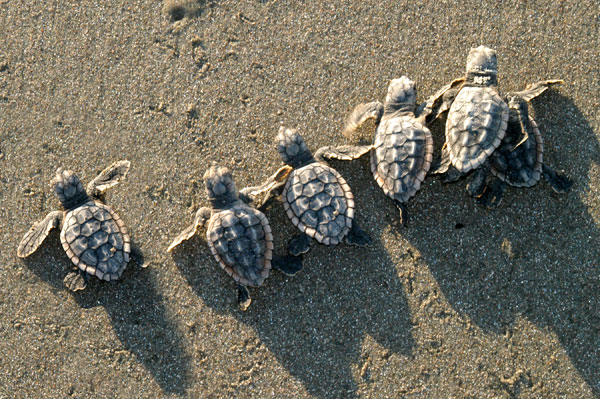While the increase in the number of nests of caretta caretta sea turtles on the beaches in Aydın since 2011 is pleasing, this year approximately 502 hatchlings successfully hatched from 720 eggs.
Five caretta caretta nests were identified on the beaches of Didim district and four on the beaches of Kuşadası, and they were taken under protection together with the experts of Aydın Nature Conservation and National Parks Branch Directorate.
Although the Aydın region is outside the sea turtle nesting areas in Turkey , one or more caretta carettas have been seen nesting almost every year since 2011.
Caretta carettas laid 720 eggs in the 9 nests and 502 hatchlings were brought to the sea in a healthy way. 218 eggs were found to be spoiled and immature.
During the inspection opening of the last nest on Kuşadası Köyüm Sitesi beach, the turtles’ meeting with the sea was followed with interest by the local residents.
Bahattin Sürücü, President of the Ecosystem Protection and Nature Lovers Association, stated that the beaches should be kept clean so that sea turtles can reproduce in a healthy way.
He said: “We estimate that the increase in the number of nests will increase in the coming years. We hope that they will multiply and that the Aydın region will become one of the official nesting areas.
“To Aydın DKMP Branch Directorate, Kuşadası and Didim Municipalities, and ADÜ we would like to thank everyone including volunteers, Güzelçamlı Fisheries Cooperative, and EKODOSD members for their contributions.
“These rare sea creatures came to Aydın beaches and started to nest. Everyone has an important responsibility in keeping beaches clean and especially free of plastic. The most striking example of pollution this year was a baby caretta caretta stuck in a diaper coming out of a nest on one of the beaches.
“Plastic bags thrown into the sea pose a great risk for loggerhead sea turtles, and turtles that swallow them thinking they are jellyfish have died. The sea turtles that died in our region were collected and sent to DEKAMER (Sea Turtle Research, Inc.) in Dalyan. Rescue and Rehabilitation Center) and in the research conducted there, significant amounts of plastic residues were found in the digestive systems of these animals. We must all fight together to keep our beaches and seas free of plastic.”
